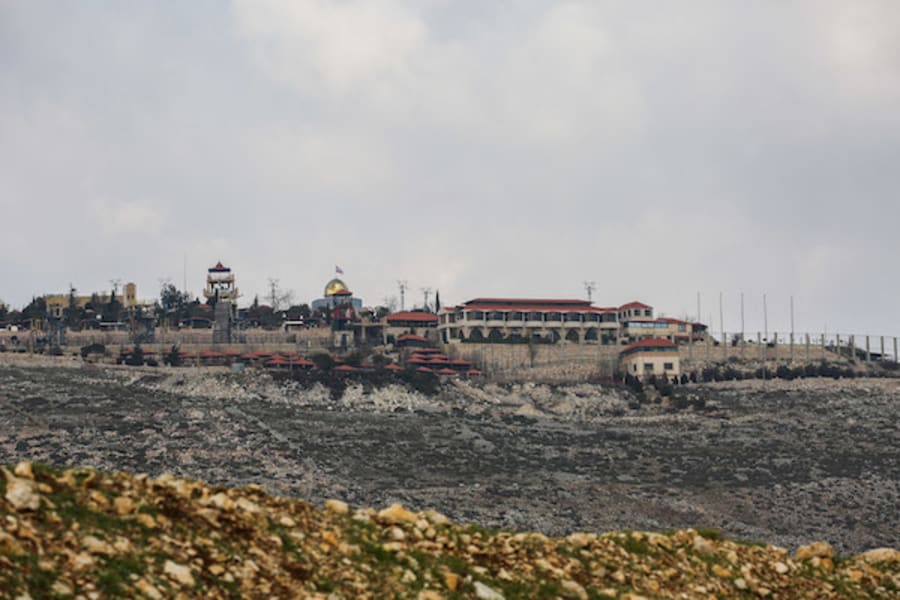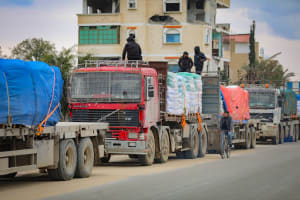HEZBOLLAH’S HUMAN SHIELDS: Iranian terror force is hiding missiles in Lebanese homes and villages, IDF intelligence officer tells ALL ISRAEL NEWS
‘Hezbollah has taken the country hostage and prisoner,’ says Lebanese member of parliament – Let us pray for the liberation of Lebanon.

HANITA KIBBUTZ (ON THE ISRAEL-LEBANON BORDER) – Hezbollah, Iran’s most dangerous terrorist proxy force, is placing Iranian missiles in the homes, schools and mosques of Lebanese civilians and turning the people of Lebanon into “human shields.”
The theory is that this allows Hezbollah to hide these weapons from the eyes of Israeli intelligence, although it doesn’t really.
What’s more, Hezbollah leaders are convinced that they are thwarting the Israeli military’s freedom of action.
Sheikh Hassan Nasrallah, the head of Hezbollah, thinks that if a war erupts that either the IDF won’t strike these homes, schools and hospitals, or that if the IDF does hit such targets then Hezbollah can use Lebanese civilian casualties to launch a propaganda war in the media to undermine Israeli morality and legitimacy to provoke global condemnation of Israel.
Such is the assessment of Lt.-Colonel (res.) Sarit Zehavi, who spent 15 years in IDF intelligence.
She is now the founder and director of the Alma Center, a non-profit and independent research and education organization that specializes in Israel’s security challenges on its northern border.
But it’s not Zehavi’s assessment alone.
Wehbe Katicha, a former Lebanese military officer and now a member of Lebanon’s Parliament, completely agrees.
Katicha is furious with Hezbollah, arguing the terror group isn’t protecting the people of Lebanon from Israel but turning the entire country into a hostage.
The massive Hezbollah missile force does not create a “balance of terror” between Israel and Hezbollah, Katicha says – that is “a big lie they tell.”
“The truth is, Hezbollah…has taken the country [of Lebanon] hostage and prisoner in order to incorporate it into the Iranian-Syrian axis,” he warned during an August 2020 interview with an Arab TV network.
I couldn’t agree more.
It grieves me enormously to see what’s happening to that beautiful country and these beautiful people, and I have committed myself to pray in 2021 for the liberation of Lebanon.
This week, Chris Mitchell – Middle East bureau chief for CBN News, and I traveled from Jerusalem up to the Israeli-Lebanon border to better understand the threat Iran and Hezbollah pose to Israel, especially if a Third Lebanon War were to break out in 2021.
We met with a range of current and former IDF officers and intelligence officials. We were particularly sobered by Zehavi’s assessment.
Here are excerpts of our conversation with her.
QUESTION: What is it like to be an Israeli living in the northern tier, so close to the border with Lebanon and Hezbollah?
LT.-COLONEL ZEHAVI: It’s peaceful right now. And it's peaceful over there. But the difference is that [on the other side of the border] there is no Lebanese government that provides all services to the population. Instead, Hezbollah, which is a terrorist organization but also a social movement, provides most of the necessities of the people, especially the Shiites.
QUESTION: We hear reports that Hezbollah is using civilian homes and other buildings to stockpile weapons. Is that true?
ZEHAVI: Hezbollah is using these villages on the other side of the border for the human shield tactic. They hide the rockets inside the villages. They hide the ammunition inside the villages. And meanwhile, they provide the necessities of the population inside the villages.
QUESTION: So, who actually controls southern Lebanon – the government or the terrorists?
ZEHAVI: So, the homes that you see on the other side of the fence are of a Christian village. But actually, the one who controls the area on the other side of the fence is Hezbollah. Sometimes we see UN vehicles also patrolling over here, just on the other side of the fence. And we also have some positions of the Lebanese army on the other side of the fence. So it's pretty crowded over there.
QUESTION: How many rockets and missiles do Hezbollah have aimed at Israel?
ZEHAVI: In south Lebanon, in the UN’s area of operation in south Lebanon, which is defined [in international law] as an area where it shouldn't be any legitimate military presence, [intelligence] assessments are of about 50,000 rockets and missiles. Around 50,000 more missiles in Lebanon, in general. So, in total, it’s more than 100,000 missiles. All of them were brought to Lebanon in order to be launched against Israel.
[Note: Zehavi is right that Hezbollah has “more than 100,000 missiles.” However, as far back as 2015, the IDF assessment was that the real number was over 150,000. Last year, a Lebanese member of Parliament warned that Hezbollah could have as many as 200,000 missiles.]
QUESTION: What’s happening with Iran and Biden and the nuclear deal, and how does all of that impact what’s happening in Lebanon?
ZEHAVI: The Iranians are desperate for these negotiations. They are desperate to get rid of all of the sanctions. They want – they need – movement in their economy. And this is something that the United States can use to get a better deal. And this is very important because the JCPOA [Joint Comprehensive Plan of Action] was limited in time in a way that [once it was over] the Iranians could become a legitimate nuclear power. It was limited in terms of inspections, meaning that the Iranians would actually hide whatever they wanted.
If the United States would come back to the nuclear deal, it would mean not only removing the sanctions; it would mean more money coming into Iran. That would mean that Iran has more money to invest in its involvement in the Middle East.
Let's not be mistaken: the money will not be prioritized to help the Iranian people. It will be first and foremost prioritized for Iranian involvement in the Middle East through its involvement in terrorism… And if more money will go to the IRGC – Iranian Revolutionary Guard Corps – it will be more money for Hezbollah in Lebanon and more money for Hezbollah in Syria and other proxies of Iran in Syria, in Yemen, in Iraq, and more instability in general to the Middle East.
QUESTION: Many people outside of Israel don’t really know what Hezbollah is. Would you describe why it’s such a serious threat?
ZEHAVI: Hezbollah is not just a social movement. And it’s not just a political party. And it's just a terrorist organization. It’s also the most professional proxy of Iran in the region. It’s the most equipped and dangerous proxy of Iran in the region.
Read Part 1 of 3 Hezbollah Treat: WILL WAR OF WORDS SPARK THIRD LEBANON WAR?
Read Part 2 of 3 Hezbollah Treat: The Israel-Lebanon border could become a battleground over Iran’s nuclear program

Joel C. Rosenberg is the editor-in-chief of ALL ISRAEL NEWS and ALL ARAB NEWS and the President and CEO of Near East Media. A New York Times best-selling author, Middle East analyst, and Evangelical leader, he lives in Jerusalem with his wife and sons.














